Shipton’s Arch | Guide to the World’s Tallest Arch
Shipton’s Arch, also known as “Toshuk Tagh” in the Uyghur language or 阿图什天门 (Ātúshi tiānmén) in Chinese, is considered to be the tallest natural arch in the world. It’s located in China’s western Xinjiang region and I’d like to share with you the story of its discovery and how (or if) it’s possible to visit today.
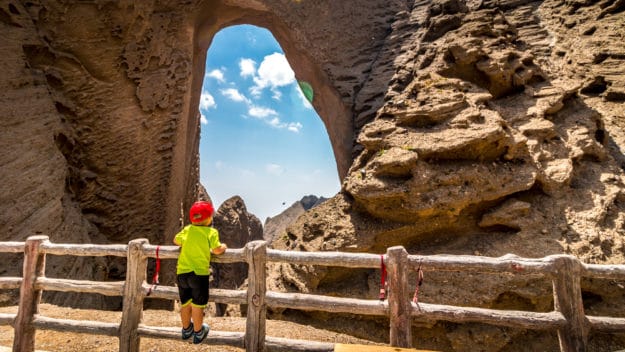
Although this odd hole in the mountain was known by the locals around the Kashgar region for centuries, the “discovery” of Shipton’s arch for the rest of the world took place in 1947.
At the time, the journey to reach the natural arch was long and arduous, requiring technical climbing skills and quite a bit of risk.
Today, the opportunity to see Shipton’s Arch is much easier thanks to staircases, paths and concrete platforms. The area has been built up for tourism, but interestingly there aren’t many tourists who go here!
Closer Look at Shipton’s Arch [Video]
How tall is Shipton’s Arch, you ask?
Measured at 457m (roughly 1,500ft), the arch could theoretically fit the Empire State Building, which measures only 443m to the tip of the antennae. It’s hard to tell from photos, but this natural arch is incredibly tall!
What I love about Shipton’s Arch is not only the magnificent beauty of the place, but also the story that led to its discovery…and later it’s rediscovery. Watch this video to learn more.
Watch more great Xinjiang videos on the FarWestChina YouTube channel!
Shipton’s Arch is located in the mountains northwest of the city of Kashgar, part of China’s far west province of Xinjiang. It’s a curious arch that has been called one of the world’s top 20 natural wonders.
If you have the opportunity and enjoy hiking outdoors, a day trip to this extraordinary Silk Road destination is worth your time. Before you go, however, take a moment to understand the history behind the discovery of this arch.
History Behind Shipton’s Arch
In this age of GPS mapping and satellite imagery, it’s not often that you can say that a place has been re-discovered in the year 2000. But that’s exactly what happened here in Xinjiang, China.
Eric Shipton, an English mountaineer famous for his Everest climbs, first introduced the arch to the world in his book Mountains of Tartary, written while he was stationed in Kashgar as British consul.
It was during this period in history that the Great Game was still afoot and this particular post along the old Silk Road was of strategic importance.

He had caught glimpses of the big arch during hikes around Kashgar but multiple approaches from the south proved unsuccessful. It wasn’t until locals guided him from the north in 1947 that he finally came face to face with this magnificent natural phenomenon:
“At last, emerging from one of these clefts, we were confronted with a sight that made us gasp with surprise and excitement. The gorge widened into a valley which ended a quarter of a mile away in a grassy slope leading to a U-shaped col. Above and beyond the col stood a curtain of rock, pierced by a graceful arch.”
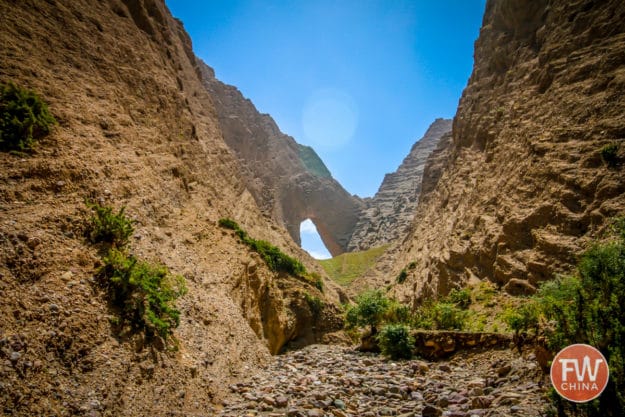
For years after Eric Shipton’s discovery, the arch was listed in the Guinness Book of Records as the “tallest natural arch” but was later edited out. The reason for its deletion was not because a taller arch had been discovered; rather, it was because the editors at Guinness couldn’t confirm the location of Shipton’s Arch…or that it even existed!

Fast-forward 50 years later. Believe it or not, no other foreigner recorded visiting the arch during those five decades until 2000 when a National Geographic sponsored expedition went in search.
Far better equipped than Eric Shipton, this group actually climbed to the top of the arch, a very dangerous climb considering the fact that the arch is made up of a very crumbly conglomerate that gives quite easily.
Once they found a suitable route and reached the top, the climbers took measurements to verify that this was, in fact, the tallest natural arch in the world – 1,500 feet (457.2 meters) high, with a 1,200-foot (366 meters) opening.
Since 2000, the allure of Shipton’s Arch was reignited and a path has been beaten by the feet of more adventurous travelers.
Development of Shipton’s Arch for Tourism
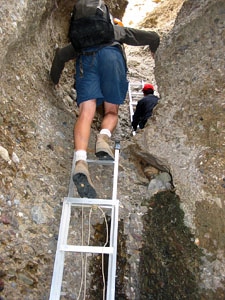
For the first decade following the National Geographic Expedition, foreign travelers began to request a visit to the arch with local travel agencies. Special arrangements had to be made and at first many of the agencies had no idea what the foreigners were talking about – a proper name in Chinese wasn’t given to the arch until the late 2000s.
These pioneering travelers, whose blogs you can still find and read today, talk about an arduous climb that included a 4-wheel drive vehicle, a local guide and a number of rickety ladders.
All of that – for better or worse – has changed.
A new road leads from the highway to a new visitor’s center right next to the trail head. Guides are no longer necessary and the ladders have been replaced by strong staircases.

Don’t get me wrong, it’s still a tiring climb that requires a certain level of fitness from those that visit. However, it’s no longer the dangerous expedition it once was.
How to Visit Shipton’s Arch Today
Before diving into specifics about visiting Shipton’s Arch, there are two things you need to know.
First, all of the information I’m about to share with you can be found in the FarWestChina travel guide, the most comprehensive and up-to-date guide available for the region. If this website has been helpful to you at all, one big way you can support me is by purchasing my book!
Second, due to the worsening political environment in Xinjiang, I’ve received reports from some travelers saying they were denied entry to the highway that leads to Shipton’s Arch. It’s unclear why this would happen and others don’t have this problem, but flexibility is required when traveling around Xinjiang. Just an FYI.
To make your own visit to Shipton’s Arch, all you need to do is arrange transportation from Kashgar for the day. This can be done either through a travel agency or by hiring a taxi off the street. For the latter, you can use the following to explain where you want to go:
- Uyghur: تۆشۈك تاغ (töshük tagh)
- Mandarin: 阿图什天门 (Ātúshi tiānmén)
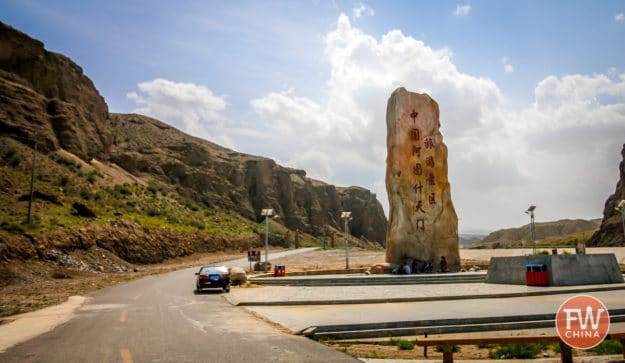
Hired transportation, depending on the type of car and season, can cost anywhere from 500-800 per day, so it’s best to get a group together if possible.
Once you reach the visitors center, which can take 1-2 hours of driving, you will be required to purchase an entrance ticket. They point you on your way and off you go!
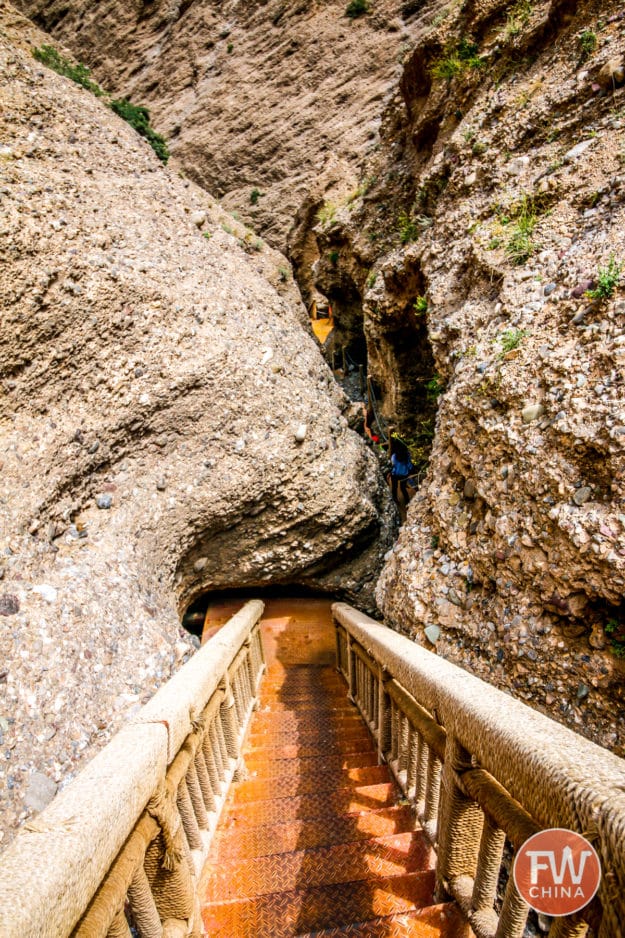
Travel Tips for Shipton’s Arch
Check out the Kashgar City Guide
- Bring Water and Snacks: You’ll be glad you did, because there’s no other place to stop and buy this during your hike.
- Visit During Sunrise or Sunset: Many tour companies offer this option to either arrive super early or stay late to see the sunrise/sunset. It’s gorgeous! The only problem is hiking in the dark, so bring a light.
- Camping at Shipton’s Arch: It used to be that travelers could easily camp at Shipton’s Arch, but with the development of the site as a tourist destination, it is unclear whether that is still an option. In addition, the grassy hill where people once camped is now a concrete-covered tourist viewing deck, so finding a good place to pitch a tent will be even harder (everything else is quite rocky!)
Final Thoughts | Shipton’s Arch
Shipton’s Arch truly is a magnificent natural wonder, the breadth of which is impossible to show with a photo and is in some ways even difficult to grasp when visiting in person.
For me, this arch proves that there are still places around the world that have yet to be discovered. It’s the reason why I went on my own Indiana Jones-like search for a fabled Buddhist relic.
If you have a chance to visit the arch and you’re in moderately good shape, I highly recommend you make the effort. You’ll be glad you did!
I’d love to hear from you – how was your experience visiting Shipton’s Arch?







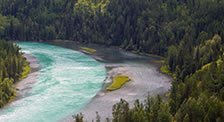
Great! I would love to visit. Thanks Josh.
[Reply]
Josh Summers on July 2nd, 2016 at 9:28 am
You should! I hope you get a chance, Andy.
[Reply]
Was that an Elmo hat?
Great visuals Josh. It must be impossible to get a sense of the scale of thing except to say it’s higher than Empire.
How on earth was it formed?
[Reply]
Josh Summers on July 2nd, 2016 at 9:28 am
Yes, my son’s favorite hat at the time ;)
Honestly, I have no idea how it was formed. It’s not a terribly windy area, at least compared to other such places I’ve been that don’t have an arch.
[Reply]
Thanks very much, Josh. Another place to visit in Xinjiang!
[Reply]
Josh Summers on July 2nd, 2016 at 9:27 am
Glad you enjoyed it! I appreciate the comment, Jonathan.
[Reply]
It was a pilgrimage of sorts that had brought us to this remote mountain range a walk in the footsteps of the legendary British mountain explorer Eric Shipton.
[Reply]
Josh Summers on August 5th, 2016 at 10:38 am
I love that – walking in the footsteps of Shipton!
[Reply]
It reminds me of Aussie dessert! Seriously planning to go to Kashgar in 2 weeks. Thanks a lot for the info!
[Reply]
Josh Summers on July 16th, 2018 at 8:16 pm
My pleasure, Gabi! Don’t forget to grab a copy of the FarWestChina Xinjiang travel guide before you go ;)
[Reply]
Hey Josh! Since u replied so fast, I’m about to buy a ticket from Kashgar to Urumqi.. do you think the scenery on the train is worth it? Not sure whether to go by flight or train.. I’m inclined for the train right now (won’t be ever again in Kashgar but probably yes in Urumqi so I should get the most of it right? Unless there is no scenery.. but even to be able to see real life through the window would be worth it..) I’m also travelling by train back to Beijing from Urumqi, but I reckon the scenery is different? Anyway any hint or opinion is highly welcomed!
[Reply]